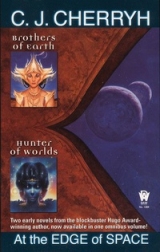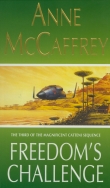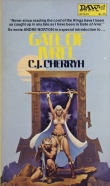
Текст книги "At the Edge of Space (Brothers of Worlds; Hunter of Worlds)"
Автор книги: C. J. Cherryh
Жанр:
Космическая фантастика
сообщить о нарушении
Текущая страница: 1 (всего у книги 36 страниц)

Table of Contents
Title Page
Copyright Page
BROTHERS OF EARTH
Chapter 1
Chapter 2
Chapter 3
Chapter 4
Chapter 5
Chapter 6
Chapter 7
Chapter 8
Chapter 9
Chapter 10
Chapter 11
Chapter 12
Chapter 13
Chapter 14
Chapter 15
Chapter 16
Chapter 17
Chapter 18
Chapter 19
Chapter 20
Chapter 21
Chapter 22
Chapter 23
HUNTER OF WORLDS
Chapter 1
Chapter 2
Chapter 3
Chapter 4
Chapter 5
Chapter 6
Chapter 7
Chapter 8
Chapter 9
Chapter 10
Chapter 11
Chapter 12
Chapter 13
Chapter 14
Chapter 15
Glossary of Foreign Terms
Praise for the novels of At the Edge of Space :
“This is top-flight adventure, with plenty of action and very good plotting. But it’s a great deal more. It’s a novel of the evils and virtues of power, of spirituality and purpose, of prejudice and of love in many forms.... The writing is clear and direct, but it never lacks feeling. The characters are shown simply and they develop into people we know and respond to deeply. This is an admirable display of good writing without any unnecessary pyrotechnics to exaggerate it. If I seem to be raving a bit, I am. I read few books that please me totally as much as this one.”
–Lester Del Rey, Analog
“An uncommonly convincing and moving novel.”
—Cleveland Plain Dealer
And for the science fiction of CJ Cherryh:
“Cherryh provides a riveting plot that emphasizes intense human/alien interactions instead of physical violence. Perhaps undervalued because she writes in traditional forms that don’t appeal to the literati, while too difficult for some fans of space opera, Cherryh remains one of the most talented writers in the field.”– Publishers Weekly
“One of SF’s most powerful imaginations.” —Booklist
“A seriously probing, thoughtful, intelligent piece of work, with more insight in half a dozen pages than most authors manage in half a hundred.” —Kirkus
“Cherryh is a born storyteller.”
—The Magazine of Fantasy & Science Fiction
DAW Titles by
C.J. CHERRYH
THE FOREIGNER UNIVERSE
FOREIGNER
INVADER
INHERITOR
PRECURSOR
DEFENDER
EXPLORER
THE ALLIANCE-UNION UNIVERSE
DOWNBELOW STATION
MERCHANTER’S LUCK
FORTY THOUSAND IN GEHENNA
SERPENT’S REACH
BROTHERS OF EARTH
HUNTER OF WORLDS
THE FADED SUN Omnibus:
Kesrith| Shon’jir| Kutath
The Chanur Novels
THE CHANUR SAGA Omnibus:
The Pride Of Chanur| Chanur’s Venture| The Kif Strike Back
CHANUR’S HOMECOMING
CHANUR’S LEGACY
THE MORGAINE CYCLE
THE MORGAINE SAGA Omnibus:
Gate of Ivrel| Well of Shiuan| Fires of Azeroth
EXILE’S GATE
OTHER WORKS:
THE DREAMING TREE Omnibus:
The Tree of Swords and Jewels| The Dreamstone
ALTERNATE REALITIES Omnibus:
Port Eternity| Wave Without a Shore| Voyager in Night
ANGEL WITH THE SWORD
CUCKOO’S EGG
VISIBLE LIGHT
SUNFALL
BROTHERS OF EARTH
Copyright © 1976 by C.J. Cherryh
HUNTER OF WORLDS
Copyright © 1977 by C.J. Cherryh
AT THE EDGE OF SPACE
Copyright © 2003 by C.J. Cherryh
All Rights Reserved.
DAW Book Collectors No. 1269.
DAW Books are distributed by the Penguin Group (USA).
All characters and events in this book are fictitious.
Any resemblance to persons living or dead is strictly coincidental.
The scanning, uploading and distribution of this book via the Internet or any other
means without the permission of the publisher is illegal, and punishable by law.
Please purchase only authorized electronic editions, and do not participate in or
encourage the electronic piracy of copyrighted materials. Your support of the
author’s rights is appreciated.
First Printing, September 2003

DAW TRADEMARK REGISTERED
U.S. PAT. OFF. AND FOREIGN COUNTRIES
—MARCA REGISTRADA.
HECHO EN U.S.A.
S.A.
eISBN : 978-1-101-49560-5
http://us.penguingroup.com
The Hanan Rebellion
Someday far, far in the future, in the 4000s, a segment of humanity fairly well splits itself off from the rest of human space and takes armed exception to intervention in their territories.
Out of this era come two stories set on the very fringes of human exploration, in Hanan space. Don’t worry that in one of them humanity seems to be on the decline . . . we’re widespread by then, and this is a local issue. Science fiction is a literature of optimism, and we’re a hardy breed . . . as witness the people caught up in these two tales.
Brothers of Earthwas, right along with Gate of Ivrel(see: The Morgaine Saga), my first novel. Hunter of Worldswas right along with these two, very early. Some have asked me where the influence for the culture might lie—and I’ll surprise no few critics who think they know by saying really it’s closer to Roman than anything you’ll see on television.
Hunter of Worldsinvolves perception and language and what’s truly alien—which might look just like us, being real competitors and instinctually different. The language freights the mental differences. If you don’t catch a word at first, look at the situation in which it’s used. You may find yourself thinking in a predatory way.
–C.J. Cherryh, Spokane, 2003
BROTHERS OF EARTH
1
Endymiondied soundlessly, a man-made star that glowed and quickly winked out of existence.
Kurt Morgan watched her until there was no more left to see, eyes fixed to the aft scanners of the capsule. When it was over, he cut to forward view and set his mind on survival.
There had been eighty men and women on Endymion,seventy-nine of them now reduced to dust and vapor, one with the ship and indistinguishable from its remains. Two minutes to sunward was another cloud that had been the enemy, another hundred individuals, the elements that had been life from a score of worlds borne still on collision course, destroyer and destroyed.
No report of the encounter would go back to Central. There was no means to carry it. The Hanan planet of origin, Aeolus, was no more than a cinder now, light-years distant; and Endymionin pursuing the Hanan enemy had given no reference data to Command. They had jumped on their own, encountered, won and perished at once; the survival capsule had no starflight capability.
A nameless star and six uncharted worlds lay under the capsule’s scan. The second was the most likely to support life.
It grew larger in his scanners over the course of seven days, a blue world wreathed in swirling cloud and patched with the brown of land. It had a large, solitary moon. In all particulars it read as an Earth-class planet, one the Alliance would have sacrificed a hundred ships to win—which they had already won if they could have known it.
The feared Hanan retaliation did not materialize. There were no ships to threaten him. The world filled the scanners now. Kurt vacillated between euphoric hope and hopeless fear—hope because he had planned to die and it looked as if he might not; and fear, because it suddenly dawned on him that he was truly alone. The idea of a possible enemy had kept him company until now. But Endymionhad run off the edge of the charts before she perished. If the Hanan were not here, then there were no other human beings this far from Sol Center.
That was loneliness.
Absolute.
The wedge-shaped capsule came in hard, overheated and struggling for life, plates shrieking as they parted their joinings. Pressure exploded against Kurt’s senses, gray and red and dark.
He hung sideways, the straps preventing him from slipping into the storage bay. He spent some little time working free, feverish with anxiety. When he had done so he opened the hatch, reckless of tests: he had no other options.
Breathable. For a time after he had exited the ship he simply stood and looked about him, from horizon to horizon of rolling wooded hills. Never in all his planetfalls had he seen the like of it, pure and unspoiled and but for the stench of burning, scented with abundant life.
He stood there laughing into the sun with the tears running down his face, and shut his eyes and let the clean wind dry his face and the coolness of the air relieve the stifling warmth that clung to him.
The land began to descend perceptibly after the forests: a long hill, a rocky bow of land, a brief expanse of beach on an unlimited expanse of sea. The sun was low in the sky before he had found a way down from the high rocks to that sandy shore.
And there he dropped his gear on the dry sand and gazed out entranced, over a sea bluer than he had ever seen, and greener than the hills, colors divided according to the depth. Isles lay against the horizon. The sand was white and littered with the refuse of the sea, bits of wood and weed, and shells of delicate pinks and yellows, in spiked and volute shapes.
Delighted as a child, he bent and dipped his hands into the water that lapped at his boots, tasted the salt of it and spat a little, for he had known what a sea ought to be, but he had never touched one or smelled the salt wind and the wrack on the beach. He picked up a stick of driftwood and hurled it far out, watched it carried back to him. Something within him settled into place, finding all the home-tales of his star-wandering folk true and real, even if it was in such a place as this, that man had never touched.
He waded at the edge a while, barefoot, careful of stepping on something poisonous, and used a stick to prod at things that lived there. But the daylight began to fade, so he could no longer see things clearly, and the wind became cold; then he began to reckon with the coming night, and gathered a great supply of driftwood and made a fire.
It was the dark that was terrible, lonely as the space between stars. He had seen birds that day, too high to distinguish; he had seen the shells of mollusks and nudged at things that scuttled off into deeper water; and several times he had startled small creatures from the high grass and sent them bounding off, quickly invisible in the brush and weeds. Nothing yet had threatened him, and no cries disturbed the night. But his mind invented images from a score of worlds. He started at every sound. The water lapped and sucked at the shore, and small scavenger crustaceans sidled about beyond the circle of firelight, seeking food.
At last he rose up and put a great deal of wood on the fire, then curled up as closely as he could before he abandoned himself to sleep.
Pebbles grated. Sand crunched. Kurt lifted his head and strained his eyes in the dying glare of the fire. Beyond it a dark dragon head rode the waters, rocking with the motion of the sea.
He scrambled for his gun, was hurled flat by sinuous bodies that hit his back, man-sized and agile. He spat sand and rolled and twisted, but a blow exploded across the side of his head, heavy with darkness. He went down again, fading, aware of the bite of cords, of being dragged through water. He choked in the brine and went out altogether.
He was soaking wet, facedown on a heaving wooden surface. He sprang up, and was tripped and thrown by a chain that linked his ankles together around a wooden pillar; when he twisted over to look up, he could make out a web of ropes and lines against the night sky, a dragon head against the moon. It was a wooden ship, with a mast for a single sail.
Men’s voices called out and oars splashed down, sweeping in unison; the motion of the ship changed, steadied,—and with a rustle and snap of canvas the great square sail billowed out overhead, men hauling to sheet it home. Kurt stared up in awe as the swelling canvas blotted out the sky and the deck acquired a different feel as the wind sped the ship on her way.
A man crowded him. Kurt scrambled up awkwardly, the chain keeping his feet apart around the mast. Others were close to him. He saw in the dim light the same structure repeated in every curious face; wide cheeks, flat noses, well-formed, with flaring nostrils; the eyes large and dark, brows wide and heavy, slightly tilted on a plane with the high cheekbones—the faces of wise children, set in a permanent look of arrogant curiosity; but the bodies were those of men, tall and slim and muscular.
They did not touch him. They looked. And finally one spoke to them with authority and they dispersed. Kurt sank down again, sick and trembling, not alone with the chill of the wind. One returned, and gave him a warm cloak for his comfort, and he clutched that about him and doubled up. He did not sleep.
No one troubled him until the first light brought color to things. Then a man set a bowl and cup beside him on the boards, and Kurt took the warm food gratefully, and drank the hot, sweetened tea.
In the growing daylight he found the men of the ship not unpleasant to look upon. They were brown– to golden-skinned, with black hair. They moved about the tight confines of the ship with amiable efficiency, and their laughter was frequent and not unkind among themselves. Kurt soon began to know some of them,—the one who had brought him the food, the gruff elder man who relayed the orders of a narrow-eyed young officer; and he thought the name of the boy who scurried around on everyone’s errands must be Pan, for that was the word others shouted when they wanted him.
They were cleanly, proud folk, and they kept their ship well ordered; human or not, they were a better crew than some lots of homo sapienshe had managed.
Fed and beginning to be warmed by the daylight, Kurt had only begun to achieve a certain calm in his situation, when the young officer approached him and had the chain removed. Kurt rose carefully, avoiding any appearance of hostility, and the man nodded toward the low cabin aft.
He let himself be directed below, where the officer opened a door for him and gestured him through.
Another young man was seated at a low writing table, on a chair so low he must cross his ankles on the floor. He spoke and Kurt’s escort left him and closed the door after; then he gestured, offering Kurt to sit too. There was no chair, only the woven reed mat on which he stood. With ill grace Kurt settled cross-legged on the mat.
“I am captain of this ship,” said the man, and Kurt’s heart froze within him, for the language was Hanan. “I am Kta t’Elas u Nym. The person who brought you in is my second, Bel t’Osanef.” The accent was heavy, the forms archaic; as Endymion’s communications officer, Kurt knew enough to make sense of it, although he could not identify the dialect.
“What is your name, please?” asked Kta.
“Kurt. Kurt Morgan. What areyou?” he asked quickly, before Kta could lead the questions where he would. “What do you want?”
“I am nemet,” said Kta, who sat with hands folded in his lap,—he had a habit of glancing down when beginning to speak. His eyes met Kurt’s only on the emphasis of questions. “Did you want that we find you? Was the fire a signal asking help?”
Kurt remembered, and cursed himself.
“No,” he said.
“Tamurlin are human like you. You camp in their land like a man in his own house,—careless.”
“I know nothing of that.” Hope surged wildly in him. Kta’s command of human speech found explanation—a Hanan base onworld, but something in the way Kta spoke the word Tamurlindid not indicate friendship between that base and the nemet.
“Where are your friends?” Kta asked, and took him by surprise.
“Dead,—dead. I came alone.”
“From what place?”
Kurt feared to answer and did not know how to lie, but Kta shrugged, and from a decanter on the table beside his desk he poured drink into two tiny porcelain cups.
Kurt was not anxious to drink, for he did not trust the sudden hospitality; but Kta sipped at his delicately and Kurt followed his example. It was thin and fruity-tasting, and settled in the head like fire.
“It is telise,” said Kta. “I offer to you tea, but teliseis more warming.”
“Thank you,” said Kurt. “Would you mind telling me where we’re going?” But Kta only lifted his small cup slightly as if to say they would talk when they were finished; and Kta took his patient time finishing.
“Where are we going?” Kurt repeated the instant Kta set his cup aside. The nemet’s short brows contracted slightly.
“My port. But you mean—what is there for you in my port? We nemet are civilized. “You are civilized too, not like the Tamurlin. I see this. Please do not have fear. But I ask: why came you?”
“My ship—was destroyed. I found safety on that shore.”
“From the sky, this ship. I am aware of such things. We have all seen human things.”
“Do you fight the Tamurlin?”
“Always. It is an old war, this. They came,—long ago. We drove them from their machines and they became like beasts.”
“Long ago.”
“Three hundreds of years.”
Kurt kept his joy from his face. “I assure you,” he said, “I did-n’t come here to harm anyone.”
“Then we will not harm you,” said Kta.
“Am I free, then?”
“In day, yes. But at night—I am sorry. My men need secure rest. Please accept this necessity.”
“I don’t blame you,” said Kurt. “I understand.”
“ Hei yth,” said Kta, and joined his fingertips together before him in what seemed a gesture of gratitude. “It makes me to think well of you, Kurt Morgan.”
And with that, Kta turned him out on the deck at liberty. No one offered him unpleasantness, even when his ignorance put him in the way of busy men. Someone would then gesture for him to move—they never touched him—or politely call to him: “ Umanu, o-eh,” which he thought was his species and a request to move. And after a part of the day had passed and he decided to imitate the crew’s manner of bows and courteous downcast looks, his status improved, for he received bows in return, and was called “ umanu-ifhan” in a tone of respect.
But at night the young officer Bel t’Osanef came and indicated he must take his place again at the mast. The seaman who performed Bel’s order was most gentle in applying the chain, and came back afterward to provide him a blanket and a large mug of hot tea. It was ludicrous. Kurt found the courage to laugh, and the nemet seemed also to understand the humor of the situation, and grinned and said, “ Tosa, umanu-ifhan,” in a tone which seemed kindly meant.
His hands left free, he sipped his tea at leisure and finally stretched out at such an angle that he did not think anyone would trip over him in the dark. His mind was much easier this night, though he shuddered to think what might have become of him if not for the nemet. If Kta’s Tamurlin were indeed fallen Hanan, then he had had an escape close enough to last a lifetime.
He would accept any conditions of the nemet rather than fall to the Hanan: and if Kta spoke the truth and the Hanan were powerless and declined to barbarism, then he was free. There was no more war. For the first time in his imagination, there was no more war.
Only one doubt still gnawed at the edges of his mind: the question of why a modern Hanan starship had run from the destroyed world of Aeolus to this world of fallen humans.
He did not want to think on that. He did not want to believe Kta had lied, or that the gentleness of these people hid deception. There was another explanation. His hopes, his reason for living insisted upon it.
In the next two days he walked the deck and scanned the whole of the ship for some sign of Hanan technology, and concluded that there was none. She was wooden from stem to stern, hand-hewn, completely reliant on wind and oars for her propulsion.
The skills by which these men managed their complex vessel intrigued him. Bel t’Osanef could explain nothing, knowing only a handful of human words. But when Kta was on deck, Kurt questioned him earnestly; when the nemet captain seemed finally to accept that his interest was unfeigned, he tried to explain, often groping for words for objects long-vanished from human language. They developed between them their own patois of Hanan-Nechai, Nechai being Kta’s own language.
And Kta asked about human things, which Kurt could not always answer in terms Kta could understand. Sometimes Kta looked puzzled at human science and sometimes shocked, until at last Kurt began to perceive the disturbance his explanations caused. Then he decided he had explained enough. The nemet was earthbound; he did not truly conceive of things extraterrestrial, and it troubled his religion. Kurt wanted least of all for the nemet to develop some apprehension of his origins.
A third day passed in such discussions, and at the dawn of the fourth, Kta summoned Kurt to his side as he stood on the deck. He had the look of a man with something definite on his mind. Kurt approached him soberly and gave a little bow of deference.
“Kurt,” said Kta, “between us is trust, yes?”
“Yes,” Kurt agreed, and wondered uneasily where this was tending.
“Today we go into port. I don’t want shame for you, bringing you with chains. But if I bring you in free, if then you do hurt to innocent people, then I have responsibility for this. What must I do, Kurt Morgan?”
“I didn’t come here to hurt anyone. And what about your people? How will they treat me? Tell me that before I agree to anything.”
Kta opened his hands, a gesture of entreaty. “You think I lie to you these things?”
“How could I know? I know nothing but what you tell me. So tell me in plain words that I can trust you.”
“I am of Elas,” Kta said, frowning, as if that were accustomed to be word enough; but when Kurt continued to stare at him: “Kurt, I swear this beneath the light of heaven, and this is a holy word. It is truth.”
“All right,” said Kurt. “Then I will do what you tell me and I won’t cause trouble. Only what is the place where we’re going?”
“Nephane.”
“Is that a city?”
Kta frowned thoughtfully. “Yes, it is a city, the city of the east. It rules from Tamur-mouth to the Yvorst Ome, the sea of ice.”
“Is there a city of the west?”
The frown deepened. “Yes,” he said. “Indresul.” Then he turned and walked away, leaving Kurt to wonder what he had done to trouble the nemet.
By midday they were within sight of port. A long bay receded into the shoreline, and at the back of it was a great upthrust of rock. At the base of this crag and on its gently rising side were buildings and walls, hazy with distance, all the way to the crest.
“ Bel-ifhan,” Kurt hailed Kta’s lieutenant, and the narrow-eyed officer stopped and bowed, although he had been going elsewhere in apparent haste. “ Bel-ifhan, taen Nephane?”
“ Lus,” Bel agreed and pointed to the promontory. “ Taen Afen, sthages Methine.”
Kurt looked at the crag Bel called Afen, and did not understand.
“ Methi,” said Bel, and when he still did not understand, the young officer shrugged helplessly. “ Ktas unnehta,” he said. “ Ktas, uleh?”
He left. They were going in. Somewhere aft, Bel shouted an order and men ran to their stations to bring in the sail, hauling it up to the yard. The long oars were run out and they dipped together, sweeping the ship toward the now visible dock at the foot of the cliffs, where a shoreside settlement nestled against the walls.
“Kurt.”
Kurt glanced from his view of the bay to the face of Kta, who had joined him at the bow.
“Bel says you have question.”
“I’m sorry. I tried to talk to him. I didn’t mean he should bother you. It wasn’t that important.”
The nemet turned one hand outward, a shrug. “Is no difficulty. Bel manages. I am not necessary.—What think you of Nephane?”
“Beautiful,” Kurt said, and it was. “Those buildings at the top—Afen, Bel called it.”
“Fortress. The Fortress of Nephane.”
“A fortress against what enemy? Humans?”
Again a little crease of a frown appeared between Kta’s wide-set eyes. “You surprise me. You are not Tamurlin. Your ship destroyed, your friends—dead, you say. But what want you among us?”
“I know nothing. I’m lost. I’ve trusted you. And if I can’t trust your given word, then I don’t know anything.”
“I don’t lie, Kurt Morgan. But you try hard not to answer my question. Why do you come to us?”
A crowd was on the docks, gaily colored clothing a kaleidoscope in the sunlight. The oars rumbled inboard as the ship glided in, making conversation impossible for the moment. Pan was poised near them with the mooring cable, ready to cast it to the men at the dock.
“Why,” asked Kurt, “do you think I should know my way in this world?”
“The others, they knew.”
“The . . . others?”
“The newhumans. The—”
Kta’s voice trailed off, for Kurt backed from him. The nemet suddenly looked frightened, opened his hands in appeal to him. “Kurt,” he protested, “wait.—No. We take—”
Kurt caught him by surprise, drove his fist to the nemet’s jaw and vaulted the rail, even as the ship shuddered against the dock.
He hit the water and water went up his nose at the impact, and again when something hit him, the gliding hull of the ship itself.
Then he made himself quit fighting and drifted, wrapped in the darkening green of the sea, a swift and friendly dark. It was hard to move against the weight of the water. In another moment vision and sense went out together.
He was strangling. He gasped for air and coughed over the water mingling with it in his throat. On a second try he drew a breath and heaved it up again, along with the water in his stomach, twisting onto the stones over on his belly while his insides came apart. When he could breathe again, someone picked him up and wiped his face, cradling his head off the stone.
He was lying on the dock, the center of a great crowd of nemet. Kta held him and implored him in words he could not understand, while Bel and Val leaned over Kta’s shoulder. Kta and both the other men were dripping wet, and he knew that they must have gone in after him.
“Kta,” he tried to protest, but his raw throat gave out only a voiceless whisper.
“You could not swim,” Kta accused him. “You almost die. You wish this? You try to kill yourself?”
“You lied,” Kurt whispered, trying to shout.
“No,” Kta insisted fervently. But by his troubled frown he seemed at last to understand. “I didn’t think you are enemy to us.”
“Help me,” Kurt implored him, but Kta turned his face aside slightly in that gesture that meant refusal, then glanced a mute signal to Val. With the big seaman’s help, he eased him onto a litter improvised out of planks, though Kurt tried to protest.
He was in shock, chilled and shivering so he could hardly keep from doubling up. Somewhere after that, Kta left him and strangers took charge.
The journey up the cobbled street of Nephane was a nightmare, faces crowding close to look at him, the jolting of the litter redoubling his sickness. They passed through massive gates and into the Afen, the Fortress, into triangle-arched halls and dim live-flame lighting, through doorways and into a window-less cell.
Here he would have been content to live or die alone, but they roused him and stripped the wet clothing off him, and laid him in a proper bed, wrapped in blankets.
There was a stillness that lasted for hours after the illness had passed. He was aware of someone standing outside the door; someone who never left through all the long hours.
At last—he thought it must be well into another day—the guards brought him clothing and helped him dress. From the skin outward the clothing was strange to him, and he resented it, losing what dignity he had left at their hands. Over it all went the pel,a long-sleeved tunic that lapped across to close in front, held by a wide belt. He was not even permitted to lace his own sandals, but the guards impatiently took over and, having finished, allowed him a tiny cup of telise,which they evidently thought sovereign for all bodily ills.
Then, as he had dreaded, they hailed him with them into the A-shaped halls of the upper Afen. He gave them no trouble. He needed no more enemies than he had in Nephane.








